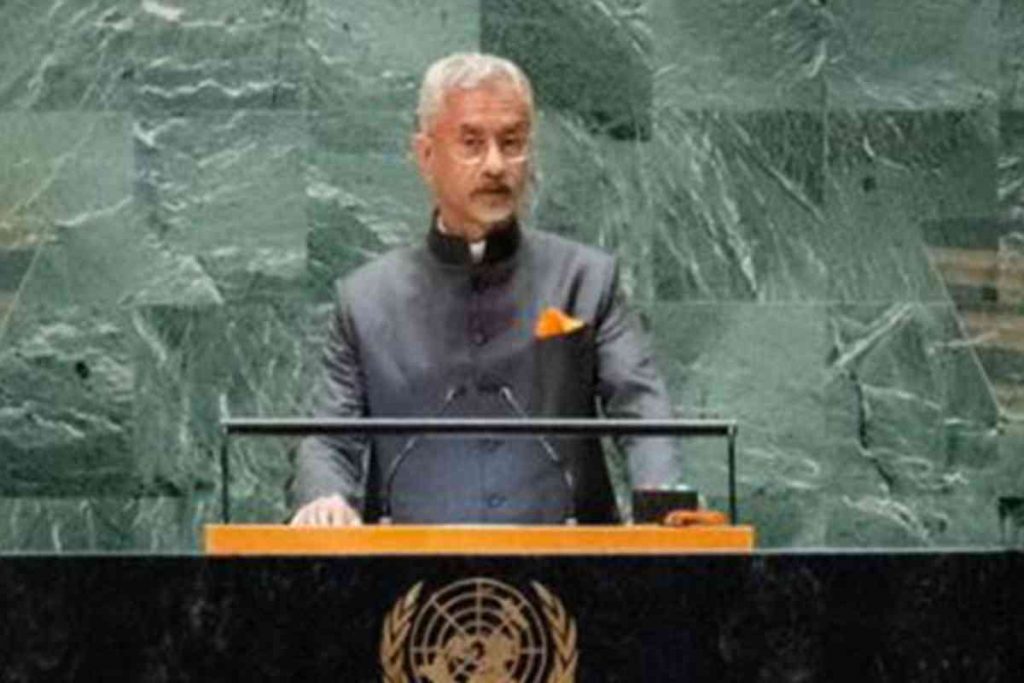External Affairs Minister S Jaishankar emphasised that large parts of the world cannot be left behind while addressing key issues and highlighted the need for a United Nations that is effective, efficient, and representative.
The remarks by Jaishankar came during his address at the 79th session of the UN General Assembly in New York on Saturday.
He said, “The global order is inherently pluralistic and diverse. The UN began with 51 members; we are now 193. The world has changed profoundly and so have its concerns and opportunities. But to address both and indeed to strengthen the order itself, it is essential that the UN be the central platform for finding common ground. And that it certainly cannot be, by remaining anachronistic.
He added, “Large parts of the world cannot be left behind when it comes to deciding the key issues of our times. An effective and efficient UN, a more representative UN and a UN fit for purpose in the contemporary era is essential.”
Highlighting the importance of global cooperation, the EAM noted that through sharing experiences, and pooling resources, the world can be transformed. “Let us therefore send out a clear message from this UNGA Session: we are determined not to be left behind. By coming together, sharing experiences, pooling resources and strengthening our resolve, we can change the world for the better,” Jaishankar said.
Jaishankar during his address, also highlighted the concerns of the Global South, and said that development plans and Sustainable Development Goal (SDG) targets are drifting away. He said, “We are gathered here at a difficult time. The world is yet to recover from the ravages of the Covid pandemic. A war in Ukraine is well into its third year. The conflict in Gaza is acquiring wider ramifications. Across the Global South, development plans have gone off rails and SDG targets are receding. But there is more.”
He highlighted the threats facing the region — unfair trade practices, devastating climate events, and food security concerns. He said, “Unfair trade practices threaten jobs, just as unviable projects raise debt levels… Technology advancements, which have long been a source of hope, are now equally a factor of anxiety. Climate events occur with greater intensity and frequency. Food security is as worrisome as health security.”
He further said, “As the world contemplates these concerns, India has sought to respond in a variety of ways.”
Elaborating on the measures, Jaishankar added, “First, by focusing on the issues of the vulnerable, women, farmers and youth. And fashioning targeted policies and initiatives for their betterment. Assured access to piped water, to electricity, to cooking gas and new homes are changing millions of lives. The gender gap has started to close, be it in health, in education or in the work place. Our food producers, thrice a year, get financial support at the click of a button. And a third-term government has made skilling of the youth its key priority.”
Jaishankar further asserted that India has made significant strides in expanding opportunities for employment and entrepreneurship. “Second, by expanding opportunities for employment and entrepreneurship, including through stronger training and large-scale financial incentives. 495 million Mudra loans have been given to small businesses in the last decade. 67 per cent of them are women. Equally telling, 6.56 million street vendors have availed 8.85 million Svanidhi loans. This is just in the last 4 years. 45 per cent of the beneficiaries are again women.”
He added, “Third, by creating templates that are replicable elsewhere. It could be digital delivery or enhancing the quality of governance and public services. As indeed, making medicines and health facilities accessible and affordable…”
The EAM stressed the importance of empowering the Global South to share its collective concerns. “Fourth, by encouraging the Global South to voice its shared concerns and come together. To that end, we have convened three Global South Summits, the most recent in August of 2024.”
He further said, “And fifth, by contributing to the well-being of the global commons and responding to the pressing needs of those in distress. This has ranged from undertaking projects in 78 nations, providing resources to neighbours and responding to HADR situations, to supplying medicines and ensuring maritime safety and security.”
